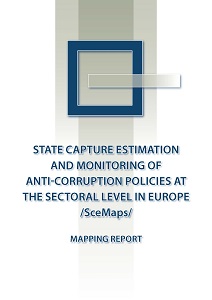Mapping Report: State Capture Estimation and Monitoring of Anti-corruption Policies at the Sectoral Level in Europe /SceMaps/
Mapping Report: State Capture Estimation and Monitoring of Anti-corruption Policies at the Sectoral Level in Europe /SceMaps/
Author(s): Todor Galev, Sorin Ioniță, Laura Raluca Ștefan, Alexander Gerganov, Daniela Mineva, Miguel Ángel Gavilanes, Daniela Andreatta, Fabrizio Costantino
Subject(s): Politics / Political Sciences, Politics, Social Sciences, Economy, National Economy, Sociology, Economic policy, Economic development, Socio-Economic Research
Published by: Център за изследване на демокрацията
Summary/Abstract: The current report maps the policy, market, institutional, technical and data availability aspects, related to state capture (SC) assessment in three economic sectors (wholesale of solid, liquid and gaseous fuels; wholesale of pharmaceutical goods; and construction) in four European countries (Bulgaria, Italy, Romania, and Spain). The assessment is based on the State Capture Assessment Diagnostics (SCAD) methodology, which describes SC as institutionalization of corruption relations which lead to virtual privatization of governance and thus instead of public goods, the state capture process delivers systematically and permanently private goods to the captors (or privatizers) of the government functions. Processwise, state capture is the abuse of good governance rules (which includes abuse of power) in the process of drafting, adoption and enforcement of the rules themselves (including the laws) in favour of a small number of captors at the expense of society and business at large. SCAD models the abuse efforts by the business through national level indicators which reflect monopolization pressure and ineffectiveness of antimonopoly laws. At the sectoral level, additional indicators are monitored, providing proxies for a privileged status of a given business entity (company), including whether: • it enjoys privileged access to public procurement; • there is legislation or laws enhancing its market position; • it has gained a privileged legal status shielding it from prosecution; or • it receives preferential treatment in getting subsidies (most often, EU funds).
Series: State Capture series
- Print-ISBN-13: 978-954-477-376-2
- Page Count: 54
- Publication Year: 2019
- Language: English
- eBook-PDF
- Table of Content
- Sample-PDF

